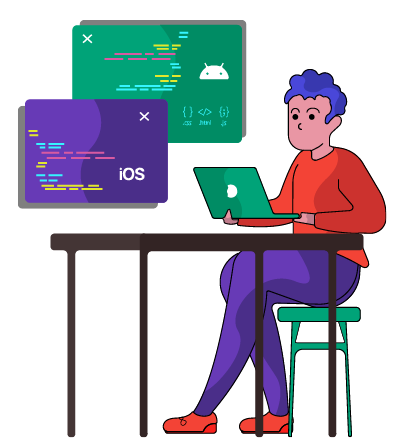Introduction
As mobile app development continues to gain traction across various industries, businesses must choose the right development approach to meet their specific needs. The Ionic Framework has been a popular choice for cross-platform app development, offering developers the ability to create apps using web technologies like HTML, CSS, and JavaScript. However, as the mobile landscape evolves, native app development is becoming increasingly important. In this article, we will discuss the future of the Ionic Framework and how it compares to native app development
The Ionic Framework: A Brief Overview
Ionic is an open-source framework for building cross-platform mobile apps using web technologies such as HTML, CSS, and JavaScript. It allows developers to create a single codebase that can run on both Android and iOS devices, thereby reducing development time and effort. However, despite its benefits, the Ionic Framework has its limitations.
Drawbacks of the Ionic Framework
-
Performance: One of the major drawbacks of the Ionic Framework is its performance. Since Ionic apps are essentially web apps running inside a WebView, they can suffer from performance issues, especially on older devices or when handling resource-intensive tasks. In contrast, native apps are specifically designed for the platform they run on, resulting in better performance and smoother user experiences.
-
Access to native APIs and features: Although the Ionic Framework provides access to a range of native APIs and features through plugins, the coverage is not as comprehensive as native app development. This can limit the functionality of an Ionic app, and developers may face challenges when trying to implement platform-specific features or access the latest platform APIs.
-
Platform-specific UI and UX: While the Ionic Framework allows developers to create a single codebase for both Android and iOS, it can be challenging to achieve a truly platform-specific look and feel. This can result in a subpar user experience, as the app may not adhere to platform-specific design guidelines and best practices.
The Future of Native App Development
As businesses increasingly recognize the importance of providing seamless, high-quality user experiences, native app development is gaining more traction. With technologies like MCSS, native app development is becoming more accessible and efficient, addressing the drawbacks of frameworks like Ionic. Here's how native app development is evolving:
-
Enhanced performance and efficiency: Native apps are specifically designed for the platform they run on, resulting in better performance and smoother user experiences. With MCSS, developers can create native apps for Android and iOS simultaneously, reducing development time and ensuring a consistent user experience across platforms.
-
Comprehensive access to native APIs and features: Native app development provides developers with full access to platform-specific APIs and features, enabling them to create more feature-rich and engaging apps. This is particularly important as mobile platforms continue to evolve and introduce new capabilities that developers can leverage to create innovative app experiences.
-
Platform-specific UI and UX: Native app development allows developers to create truly platform-specific user interfaces, adhering to design guidelines and best practices for each platform. This results in better user experiences, higher user satisfaction, and improved app adoption.
-
Adaptability and future-proofing: Native app development ensures that apps can easily adapt to changes in mobile technology, making them more future-proof. As new features and APIs are introduced, native apps can readily incorporate these updates, ensuring that they remain relevant and competitive in the ever-evolving mobile landscape.
Conclusion
In conclusion, the future of mobile app development is shifting towards native app development. While the Ionic Framework has its advantages, the drawbacks in terms of performance, access to native APIs, and platform-specific UI design make native app development a more compelling choice for businesses looking to create high-quality, engaging mobile experiences.
With technologies like MCSS, native app development is becoming more accessible and efficient, making it an increasingly attractive option for businesses and developers alike. MCSS simplifies native app development by allowing developers to create apps for both Android and iOS platforms simultaneously using a single codebase. This reduces development time and costs while maintaining the performance, functionality, and platform-specific user experience benefits of native app development.
As the mobile landscape continues to evolve, it is essential for businesses and developers to stay ahead of the curve by embracing the latest technologies and development approaches. By leveraging MCSS and focusing on native app development, businesses can ensure that their apps provide the best possible user experience, access to the latest platform features, and compatibility with future updates and innovations in the mobile space.
Ultimately, while the Ionic Framework has served as a valuable tool for cross-platform app development, the growing importance of native app development cannot be ignored. As user expectations continue to rise, the future of mobile app development will be defined by the ability to create engaging, high-performance, and platform-specific experiences that cater to the unique needs and preferences of mobile users. By choosing native app development and harnessing the power of MCSS, businesses can position themselves for success in this rapidly changing landscape, ensuring that their apps remain competitive, relevant, and appealing to their target audience.

